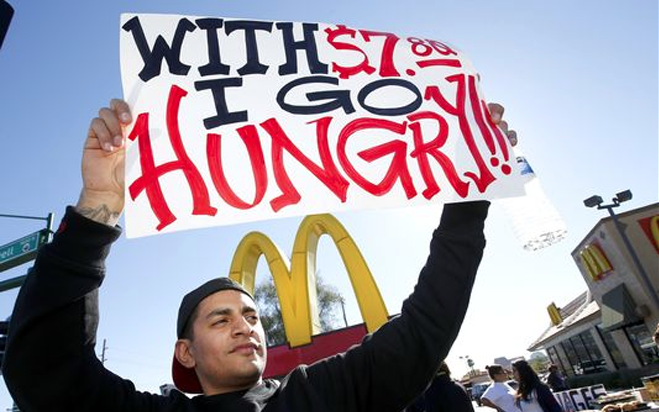

Certainly workers who are earning $8 an hour today would be better off if they were earning $12 tomorrow.
The problem is that a $12 minimum wage doesn’t force employers to pay $12 to every worker.
It only forces the employer to pay $12 to the workers the employer chooses to keep.
The employer pays $0 to the workers who get laid off, or who are never hired in the first place.
Suppose Bob owns a burger joint. The reason Bob hires Al to flip burgers is because Al creates value for Bob. Suppose that not counting what Bob pays the kid, he makes 10 cents profits for every burger he sells.
If the kid makes 100 burgers per hour and is paid $8 per hour, then the owner’s profit is $2.
Now, suppose that Bob hires two more workers, Fred who can cook 120 burgers per hour and Carl who only cooks 90.
To Bob the owner, Fred creates $4 profit per hour, Al creates $2, and Carl creates only $1. For a total profit of $7 per hour.
If the government raises the minimum wage to $9.50, Al and Fred still create value for the owner, but Carl creates a loss of 50 cents.
What should Bob the business owner do?
Bob has a mortgage, a wife, and a couple of kids of his own to support, perhaps even dreams of opening a second location creating even more jobs, but now his profit has been cut from $7 to $2.50 per hour.
It’s not sustainable.
The first thing that needs to happen is Carl needs to be fired. His skill level simply does not justify his cost.
Minimum wage laws do not help the worker at the expense of the owner, it helps the more productive workers at the expense of the less productive workers.
What’s even worse is that the more productive workers usually don’t need the help.
Over time, more productive workers get a raise, a promotion, or a new job.
The majority of workers who benefit from the minimum wage hike would have ended better off anyways, even if the minimum wage hadn’t existed. But it was no help at all to the most vulnerable workers.
That’s the way it works in the real world.
The majority of workers who accept a minimum wage job are earning more than minimum wage within a year.
Increases in the minimum wage have almost zero effect on unemployment among college graduates, a small effect among high-school graduates, and a very large effect among the least educated, least skilled workers.
The minimum wage may be a well-intentioned policy, but it hurts the very workers who are in most need of help.
Just putting Carl out of a job has only raised Bob’s profit up to $3, where it used to be $7.
In order for Bob to maintain his lifestyle, Bob will need to raise the price of a burger.
Although minimum wage laws are supposed to combat the effects of inflation – the effect of minimum wage laws is to increase inflation!
The higher price of burgers (and everything else) creates less demand, especially from people with low or no incomes – such as Carl who lost his job.
Bob is also less likely to expand his business and create more jobs, just as new businesses are less likely to open. This means even fewer opportunities for newcomers to the workplace, young people, immigrants, and people with low skills.
And all of them have to pay more for a burger.
Meanwhile, Carl is still out of work and has gone on social assistance, draining tax dollars from everyone else.
Though minimum wage laws help a few people in the short term – namely the people who are making exactly the minimum wage and the politicians who polish their halos promoting such laws – the truth is that everyone suffers from them in the long term.
Well, almost everyone.
Although large companies have larger payrolls to deal with, they are much less likely to be driven out of business as small time operators like Bob’s Burger Joint.
Minimum wage laws protect large corporations by driving out small time competitors.
Alas, politics are a short term game, and good intentions an effective pacifier to long-term thinking.
